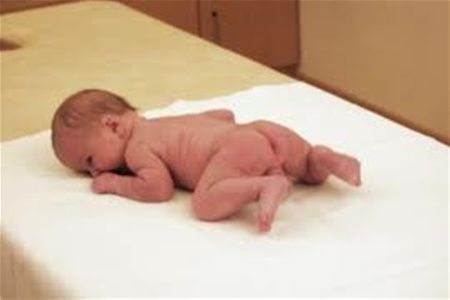Medical expert of the article
New publications
Baby's first days: how to cope with a toddler?
Last reviewed: 04.07.2025

All iLive content is medically reviewed or fact checked to ensure as much factual accuracy as possible.
We have strict sourcing guidelines and only link to reputable media sites, academic research institutions and, whenever possible, medically peer reviewed studies. Note that the numbers in parentheses ([1], [2], etc.) are clickable links to these studies.
If you feel that any of our content is inaccurate, out-of-date, or otherwise questionable, please select it and press Ctrl + Enter.

So your baby was born, and now you don’t know how to take care of him, how to react to his crying, to difficulties with bathing, to reddened skin – you don’t know anything about him at all. The first days of a child are the most difficult for moms and dads. What features of a newborn should you pay attention to?

Bonding between a newborn and his mother
Your baby may not be able to move or talk yet, but he or she has a very close bond with mom through every touch, kiss, and love you give. Don’t worry if you don’t feel that connection at first. This process takes time. Just relax and try:
- Touch his skin
- Look into his eyes
- Talk to him
- Hug him
 [ 1 ]
[ 1 ]
How to Hold Your Newborn
Always …
- Support his head with your hand behind his neck.
- Use a holding position that will help your newborn calm down faster. Some babies need a little space when being held, while others feel safer when they are as close to their mother as possible.
- Keep your baby as close to you as possible when you hand him to someone else. Have the person put their hands under the baby before you remove yours. This will prevent the baby from being dropped.
Never...
- Avoid grabbing your baby with sudden movements that could shake his brain, which is still very fragile and growing.
- Do not carry your baby in a special device while you cook, chop vegetables, barbecue, or participate in other potentially dangerous activities.
- Do not keep your child in a car without a car seat that is securely fastened in the back seat. Remember, you cannot carry a child in the front seat.
- Don't shake your baby - even in play. Babies under 6 months are prone to "shaken baby syndrome," which can cause bruising and bleeding of the brain, spinal cord injury, eye damage, and even death - all from being shaken too hard.
Jaundice in newborns: signs and treatment
More than half of all newborns develop jaundice, the medical term for a yellowish discoloration of the skin. The yellow color is caused by excess bilirubin, a biochemical that builds up in the blood. In older children and adults, bilirubin is eliminated from the body very quickly and automatically. But a baby's immature liver is sometimes unable to process the incoming nutrients, and the buildup causes jaundice.
To check for jaundice, expose your baby to natural light or fluorescent lighting, and:
- Press your finger gently on your baby's forehead or the tip of his nose. The skin should look white (applies to babies of all races). If it looks yellowish, tell your doctor.
- Check the whites of your child's eyes. If they look yellow, see a doctor.
Jaundice is usually harmless and goes away in a few days, but your doctor will have your baby have regular blood tests to monitor the condition, which can cause brain damage. If your baby's condition doesn't improve, your doctor may recommend phototherapy. In general, jaundice should go away in a day or two.
Help after cutting the umbilical cord
Your baby's umbilical cord stumps will fall off over the first few weeks. Until then:
- Diapers should be positioned below the belly button to avoid irritating the area around the belly button.
- You can lubricate the umbilical cord with something disinfectant. For example, brilliant green. It's okay if the navel gets a little wet - just blot it with a swab.
Call your pediatrician if:
- Pus is oozing from your belly button or you see a smear of blood on your diaper (a little blood on your diaper is normal while your belly button is healing).
- The skin at the base of the belly button becomes red, your baby feels pain when you touch it, or the area has an unpleasant odor. This may indicate infection, and your baby needs immediate medical attention.
No way...
Don't use alcohol on your belly button. Research shows that if you use it on your baby's umbilical cord, it can take up to two days longer to heal.
Prepare everything necessary for the child
During the first week or two, until the cord falls off, use a sponge or swab to clean the baby's belly button. Meanwhile, prepare everything you need for your baby: a bath tub, baby soap, shampoo, cotton balls, a terry towel for the baby (preferably with a hood).
- When undressing a child, wrap him in a towel and place him on a soft surface. Never grab the child by the bare body with your hands – he may slip and fall.
- Keep your baby's body parts covered with a towel to keep them warm.
- Clean the baby's upper eyelids with a sponge soaked in warm water. Remove discharge from the eyes with soaked natural cotton swabs.
- Wipe the outside of the ears with a sponge.
- Wash all folds on the neck, arms and legs.
- In the genital area, gently wipe the skin from front to back. If you have a boy, do not pull his foreskin; gentle cleaning will be enough.
- Wash the baby's head with shampoo, squeezing clean water from a wet washcloth onto the baby's hair, while the baby should be securely supported.
- After bathing, wrap the baby in diapers and dress him.
To keep your child safe while sleeping

- Always place your baby to sleep on his back.
- Make your home smoke free and do not allow anyone to smoke in your home.
- Air out bedding - blankets and pillows - by removing them from your baby's crib.
- Maintain the temperature in your baby's room at 18 degrees Celsius to prevent your baby from overheating while sleeping.
- Breastfeed your baby for as long as possible, this will strengthen your baby's immunity and protect him from upper respiratory infections.
Monitor your child's bowel movements
For the first few days after birth, your baby's bowel movements may be sticky and greenish-black in color. This is a substance called meconium, and it's completely normal to pass it. It's the stuff that filled your baby's intestines when he was in the womb. Once your baby's body gets rid of it, his poop will look yellowish-orange.
After about a week (and for the next six months), the consistency and frequency of your baby's bowel movements will depend on whether he's breastfed or formula-fed. Although it's normal for a baby to have bowel movements anywhere from five or six times a day to once every few days, breastfed babies tend to have them less frequently; breast milk is easily digested.
If your child has any of the following symptoms, contact your pediatrician. They may indicate an infection or food allergy.
- You see mucus or blood in your child's stool.
- He has diarrhea.
- He did not have a bowel movement during his first week after birth.
- His stool remains black and sticky a week after birth
Taking care of yourself in the first days after the birth of your baby
As much as you are eager for your baby to be born, feeding, changing, and sleepless nights can be exhausting. Remember: he needs you right now, and always. So take care of yourself so that you are healthy and can care for your baby fully.
- Drink plenty of fluids. This is especially important if you are breastfeeding.
- Eat the vegetables and fruits that your doctor has allowed. Let them always be in your home, let them always be available to you.
- Get enough sleep. Sleep as much as you can!
- Don't take on all of your baby's care. Asking for help from family and friends - or a nurse - isn't a sign of weakness or inability, it's a sign that you're doing everything in your power to provide the best care for your newborn.
The first few weeks at home with a newborn are joyful - but they can also be hectic. You're worried about getting a good, restful sleep, feeding, baby's comfort - everything - and it's a lot more than you're used to. But don't worry if you struggle in the first few days with your baby: you'll soon be a pro mom in no time.
 [ 4 ]
[ 4 ]

